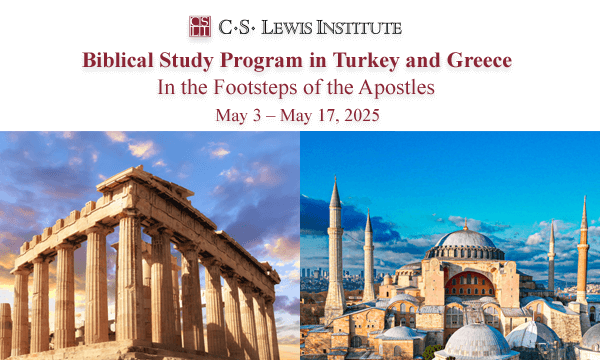May 2006
Someone once humorously remarked that, “the capacity of the human mind to rationalize is infinite.” If we have the least bit of self-awareness, we know how true this is of ourselves – how easily we rationalize away our sins with endless excuses.
C.S Lewis understood this problem and has helpful insight for those of us who struggle in this area.
 I find that when I think I am asking God to forgive me I am often in reality (unless I watch myself very carefully) asking Him to do something quite different. I am asking Him not to forgive me but to excuse me. But there is all the difference in the world between forgiving and excusing. Forgiveness says “Yes, you have done this thing, but I accept your apology; I will never hold it against you and everything between us two will be exactly as it was before.” But excusing says “I see that you couldn’t help it or didn’t mean it; you weren’t really to blame.” If one was not really to blame then there is nothing to forgive. In that sense forgiveness and excusing are almost opposites. Of course, in dozens of cases, either between God and man, or between one man and another, there may be a mixture of the two. Part of what seemed at first to be the sins turns out to be really nobody’s fault and is excused; the bit that is left over is forgiven. . . . .
I find that when I think I am asking God to forgive me I am often in reality (unless I watch myself very carefully) asking Him to do something quite different. I am asking Him not to forgive me but to excuse me. But there is all the difference in the world between forgiving and excusing. Forgiveness says “Yes, you have done this thing, but I accept your apology; I will never hold it against you and everything between us two will be exactly as it was before.” But excusing says “I see that you couldn’t help it or didn’t mean it; you weren’t really to blame.” If one was not really to blame then there is nothing to forgive. In that sense forgiveness and excusing are almost opposites. Of course, in dozens of cases, either between God and man, or between one man and another, there may be a mixture of the two. Part of what seemed at first to be the sins turns out to be really nobody’s fault and is excused; the bit that is left over is forgiven. . . . .
But the trouble is that what we call “asking God’s forgiveness” very often really consists in asking God to accept our excuses. What leads us into this mistake is the fact that there usually is some amount of excuse, some “extenuating circumstances.” We are so very anxious to point these out to God (and to ourselves) that we are apt to forget the really important thing; that is, the bit left over, the bit which the excuses don’t cover, the bit which is inexcusable but not, thank God, unforgivable. And if we forget this, we shall go away imagining that we have repented and been forgiven when all that has really happened is that we have satisfied ourselves with our own excuses. They may be very bad excuses; we are all too easily satisfied about ourselves.1
Unacknowledged sin is unconfessed sin, unconfessed sin is unforgiven sin, and unforgiven sin blocks our fellowship with God and leads to spiritual stagnation and eventual backsliding. The way forward is simple and clear: ruthless honesty with ourselves and with God, which restores fellowship and the joy of our salvation.
If we confess our sins, he is faithful and just and will forgive us our sins and purify us from all unrighteousness.
I JOHN 1:9 NIV
1 “On Forgivenss” C.S. Lewis, The Weight of Glory (San Francisco: HarperSanFrancisco, a division of HarperCollins, 2001), pp. 178-179.
 COPYRIGHT: This publication is published by C.S. Lewis Institute; 8001 Braddock Road, Suite 301; Springfield, VA 22151. Portions of the publication may be reproduced for noncommercial, local church or ministry use without prior permission. Electronic copies of the PDF files may be duplicated and transmitted via e-mail for personal and church use. Articles may not be modified without prior written permission of the Institute. For questions, contact the Institute: 703.914.5602 or email us.
COPYRIGHT: This publication is published by C.S. Lewis Institute; 8001 Braddock Road, Suite 301; Springfield, VA 22151. Portions of the publication may be reproduced for noncommercial, local church or ministry use without prior permission. Electronic copies of the PDF files may be duplicated and transmitted via e-mail for personal and church use. Articles may not be modified without prior written permission of the Institute. For questions, contact the Institute: 703.914.5602 or email us.
-
Recent Podcasts
A Welcome Change in Apologetics
by Randy Newman on April 18, 2025Apologetics has for a long time, been motivated...Read More
-
Resisting God – Dr. John W. Taylor’s Story
by Jana Harmon, John Taylor on April 11, 2025
-
The Defiance of Grace in the Ministry of Christ
by Dane Ortlund, Aimee Riegert on April 4, 2025
-
Recent Publications
Who Is The Real Jesus?
by John R.W. Stott on April 1, 2025The 21st century has provoked many conversations and...Read More
-
Does the Modern World Face a Crisis of Meaning?
by Cameron McAllister on March 1, 2025
-
The Impact of Technology on the Christian Life
by Tony Reinke on February 14, 2025

GLOBAL EVENT: 2025 Turkey & Greece Study Program – In the Footsteps of the Apostles
On May 3, 2025 at 3:00 pmat İstanbul, TürkiyeSpeakers
Team Members
C.S. Lewis Institute
Author
C.S. Lewis Institute, in the legacy of C.S. Lewis, works to develop wholehearted disciples of Jesus Christ who will articulate, defend, share, and live their faith in personal and public life. Founded in 1976 by Dr. James Houston and James R. Hiskey, the Institute provides leading teachers who address important issues of the day from the perspective of Biblical orthodoxy, while also providing discipleship for individuals in small groups.





